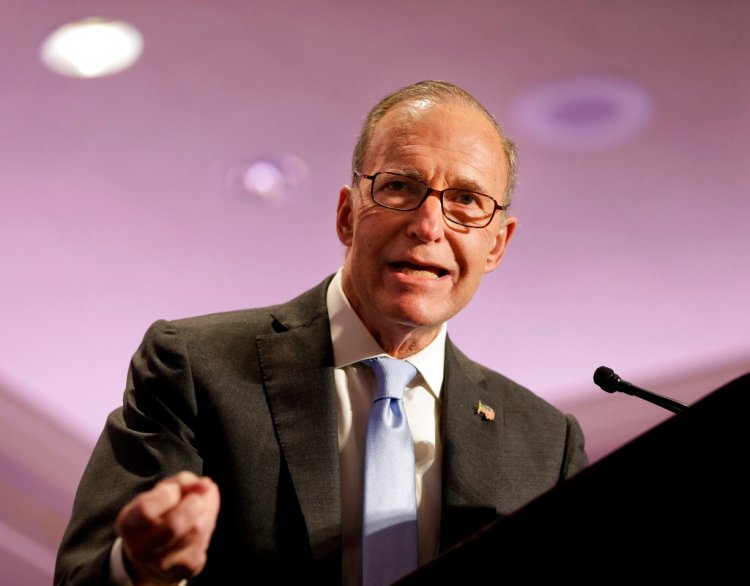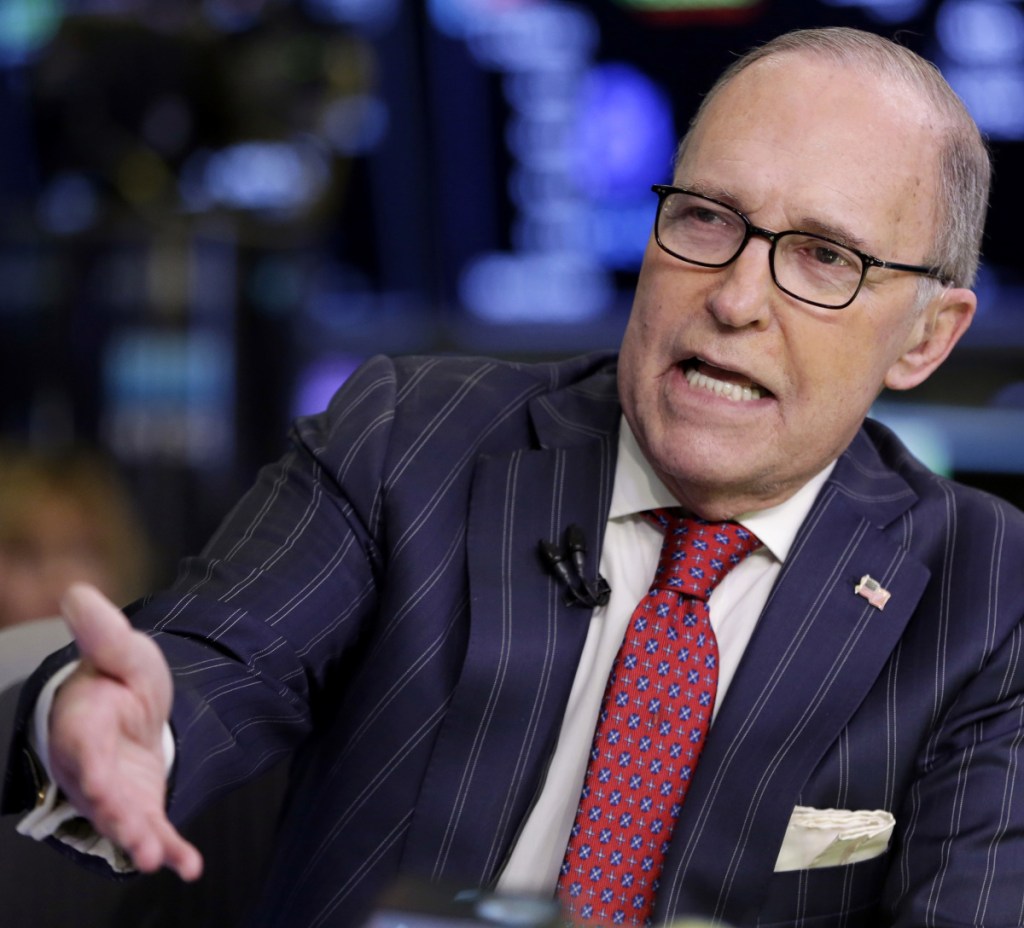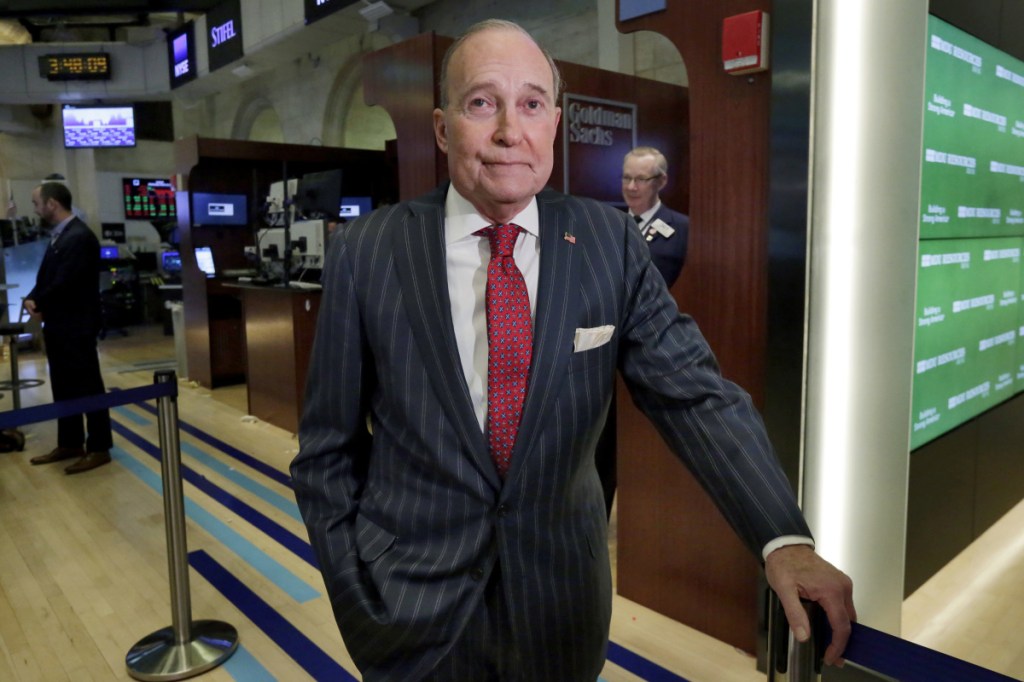WASHINGTON — President Trump has chosen Larry Kudlow to be his top economic aide, elevating the influence of a longtime fixture on the CNBC business news network who previously served in the Reagan administration and has emerged as a leading evangelist for tax cuts and a smaller government.
Kudlow said Wednesday that he has accepted the offer, and that the U.S. economy is poised to take off after Trump signed $1.5 trillion worth of tax cuts into law.
“The economy is starting to roar and we’re going to get more of that,” he said.
Kudlow will join an administration in the middle of a tumultuous remodeling as a wave of White House staffers and top officials have departed in recent weeks. On Tuesday, Trump dumped his secretary of state, former Exxon Mobil CEO Rex Tillerson.
The famously pinstripe-suited Kudlow would succeed Gary Cohn, a former Goldman Sachs executive who is leaving the post in a dispute over Trump’s decision to impose tariffs on imported steel and aluminum.
With Trump’s tax cuts already being implemented, Kudlow would be advising a president who appears increasingly determined to tax foreign imports – a policy that Kudlow personally opposes. Kudlow said he is “in accord” with Trump’s agenda and that his team at the White House would help implement the policies set by the president.
BLUNT DEBATER, VERY LOYAL
Trump has promised to reduce the trade imbalance with China and rewrite the North American Free Trade Agreement with Canada and Mexico. Kudlow declined to say what advice he would give the president on trade issues, saying instead that Trump is “a very good negotiator.”
Kudlow, 70, has informally advised the Trump administration in the past and he has spoken with the president “at some length in recent days” so he is ready “to hit the ground running.”
Friends and colleagues say Kudlow possesses two critical attributes prized by the president: He is a bluntly spoken debater and is resolutely loyal.
“He’s a very sensitive man and a very logical man, which is exactly what Trump needs,” said Arthur Laffer, a well-known economist and longtime friend of Kudlow.
The two men and their wives used to celebrate New Year’s Eve together outside San Diego, where Laffer lived at the time. In the Reagan administration, Kudlow worked in the White House budget office and Laffer served on an economic policy advisory board. Both built their economic visions around the notion that tax cuts are critical for maximizing economic growth, a principle at the heart of the $1.5 trillion tax reduction Trump signed into law late last year.
In 1987, Kudlow moved to Wall Street and served as chief economist at Bear Stearns. He left that position in the early 1990s, after which he worked at Laffer’s research and consulting firm.
Kudlow soon settled comfortably into the world of political and economic punditry, working at the conservative National Review magazine and ultimately becoming a host of CNBC shows beginning in 2001. He has remained a contributor to CNBC and a colleague and friend for many at the network.
VIEWS CAN SOMETIMES BE WRONG
Kudlow channeled his push for lower taxes into a 2016 book he co-wrote, in which he argued that President John F. Kennedy’s tax cuts had boosted economic growth. The book, “JFK and the Reagan Revolution,” asserted that Reagan’s 1980s tax cuts followed the same template. When Trump’s own tax cuts ran into resistance over the higher budget deficits that would result, Kudlow downplayed the risks of debt. He argued on CNBC that Reagan ran even higher deficits to finance tax cuts and military spending – a formula that Kudlow contends helped accelerate growth.
Kudlow has, at times, been overly optimistic – if not outright mistaken – about what Republican administrations can achieve for the economy. He declared in a December 2007 column for National Review that George W. Bush’s presidency was ushering in a new golden era.
“There’s no recession coming,” Kudlow wrote. “It’s not going to happen.”
Economists later concluded that the Great Recession and the financial meltdown it triggered began the month that column was published.
Laffer described Kudlow as someone who would be inclined to offer “unvarnished” advice to the president on the appropriate path for economic policy.
“And if by chance, he doesn’t convince the president of something, he will be a loyal employee,” Laffer said. “He stays loyal even if the decision goes against him.”
Jared Bernstein, who was an economic adviser to Vice President Joe Biden during Barack Obama’s presidency, said he’s been debating Kudlow from the opposite side of the ideological fence for decades and still likes him. Bernstein said he has never managed to convince Kudlow that that tax cuts that he has zealously championed have failed to deliver the promised growth, a view shared by many academic economists. But Kudlow understands trade, the Federal Reserve, employment, inflation and the financial markets, Bernstein said.
Send questions/comments to the editors.





Success. Please wait for the page to reload. If the page does not reload within 5 seconds, please refresh the page.
Enter your email and password to access comments.
Hi, to comment on stories you must . This profile is in addition to your subscription and website login.
Already have a commenting profile? .
Invalid username/password.
Please check your email to confirm and complete your registration.
Only subscribers are eligible to post comments. Please subscribe or login first for digital access. Here’s why.
Use the form below to reset your password. When you've submitted your account email, we will send an email with a reset code.